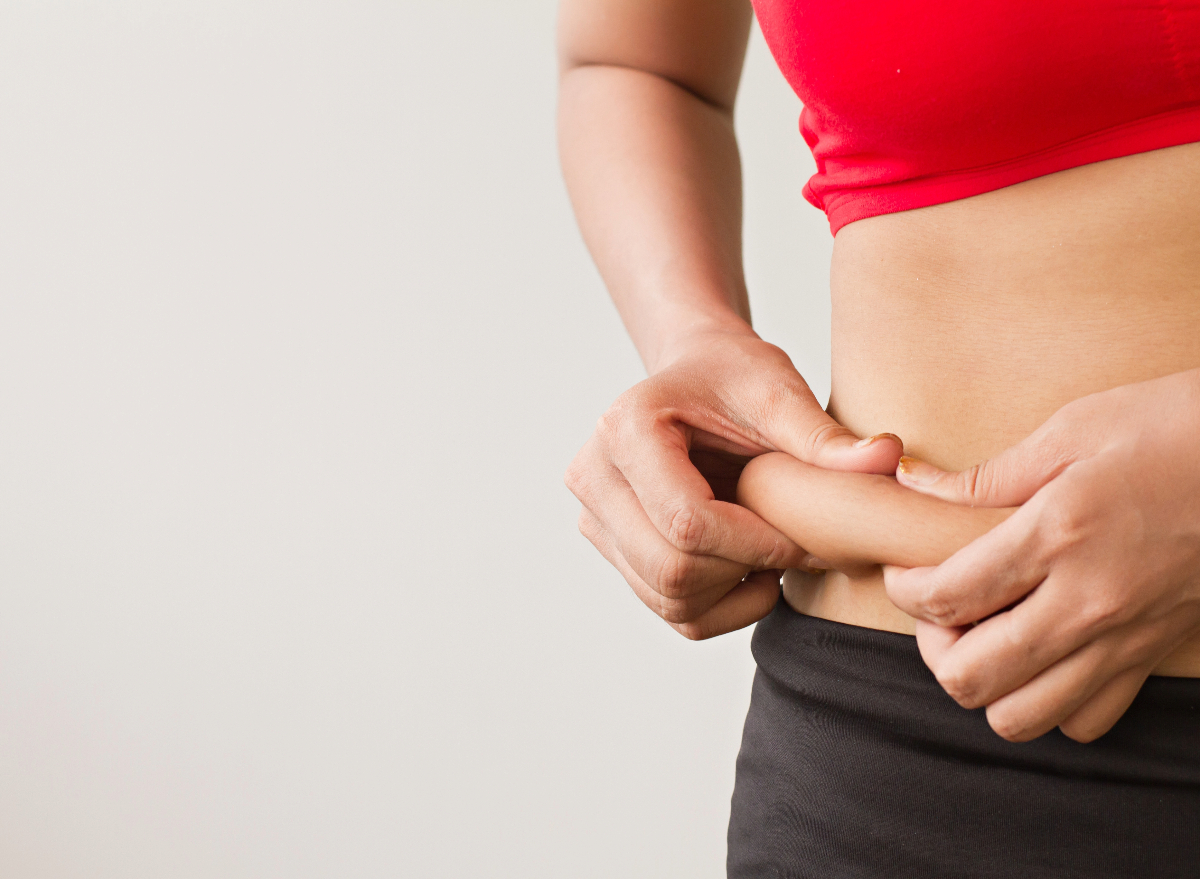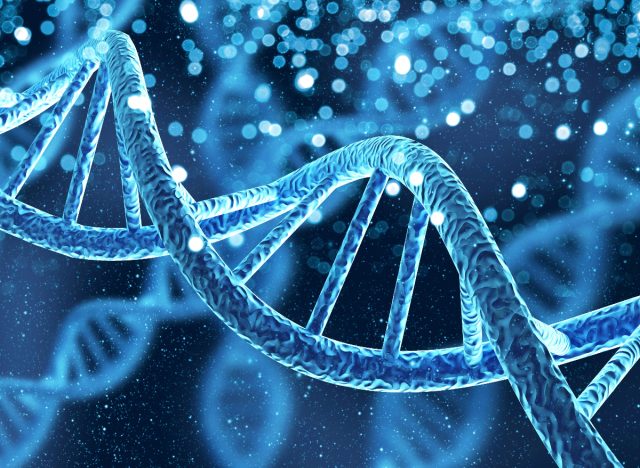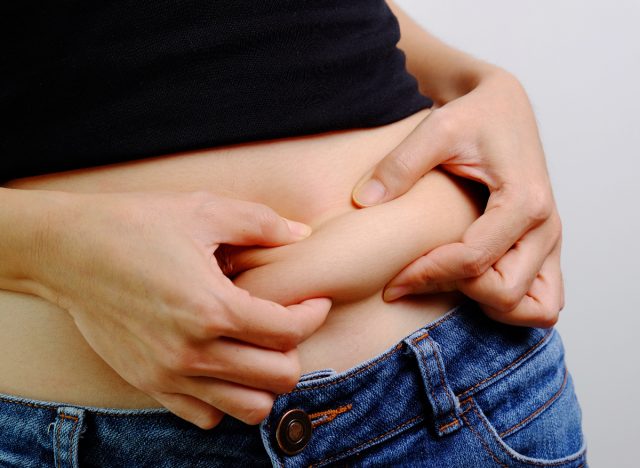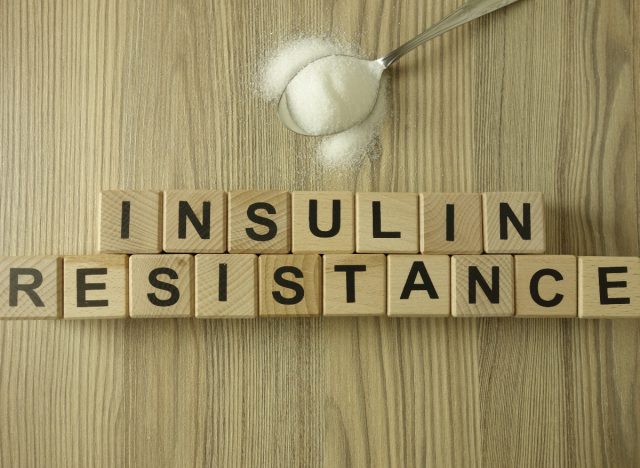5 Reasons It's So Hard To Lose Inches off Your Waist & What To Do About It

The unfortunate truth about weight loss is that it's often easier said than done. And if you've encountered obstacles in your quest for a slimmer, healthier figure, you're far from alone. According to data from the International Food Information Council, 52% of U.S. adults between 18 and 34 years old attempted to diet in 2022. But while trying to shed stubborn belly fat can be a frustrating endeavor, understanding why it's so challenging is the first step toward shrinking your waistline. That's why we chatted with Destini Moody, RDN, CSSD, LD, a registered dietitian and sports dietitian with Garage Gym Reviews, who shares the five main reasons why it's so dang hard to lose inches off your waistline. Moreover, she delivers actionable solutions and advice on what you can do about it.
So, if you're ready to sculpt a trimmer waistline and learn the reasons why it's hard to lose inches off your waist, keep reading. And up next, check out The #1 Protein to Eat for Weight Loss, According to a Dietitian.
Genetics

Genetics can play a significant role in where your body stores fat. Some people have a natural predisposition to carry excess weight around their waistline. In fact, one study found genetics can account for 56% of abdominal belly fat and 42% of subcutaneous fat. While you can't change your genetic makeup, understanding this factor can help you tailor your weight loss approach.
"Ethnicity and lineage can not only play a role in how much fat you carry but also where you store fat," Moody explains. "What it comes down to is what receptors your fat tissue has, which is greatly influenced by genetics. Chemicals called catecholamines are responsible for 'burning' your fat for energy. These chemicals do this by attaching to two types of receptors in your fat cells: alpha-2 and beta-2. The more beta receptors a fat cell has, the easier it is for a catecholamine to attach to and burn it. The problem is the 'stubborn' fat in the tummy tends to have more alpha receptors than betas. That makes it more difficult for the body to burn it off and genetics greatly influence how many receptors you have."
Gender

According to research, men tend to accumulate fat in their abdominal area more than pre-menopause women, mainly due to hormonal differences. Conversely, women often struggle with fat accumulation in the hips and thighs. Understanding these gender-specific patterns can help you set realistic goals and better target your weight loss efforts.
"Testosterone is a hormone with the unique quality of helping the body to maintain muscle mass and keep body fat to a minimum. Given that men biologically have more testosterone than women, it makes sense why they tend to find losing belly fat much easier than women do," Moody tells us. "Furthermore, women need a certain amount of body fat to maintain their hormonal balance, as there can be unhealthy disruptions in estrogen and menstrual cycles if fat mass dips too low. Thus, women's bodies tend to hold onto fat mass purely for survival and maintenance of equilibrium and this includes the fat mass contained in the belly."
Alcohol Consumption

Enjoying the occasional drink every now and then is perfectly fine, but keep in mind that alcoholic beverages are calorie-dense. Research confirms that even moderate alcohol consumption can hinder your efforts to lose inches from your waist; it can result in a larger abdominal region.
"Alcohol alters your metabolism in a number of ways, including increasing hunger, making it harder to metabolize and store nutrients properly, and adding extra, empty calories to the diet," says Moody. "The rapid fat storage that often comes with excess drinking nearly always lands in the midsection. If this habit isn't kept under control, you'll find losing abdominal fat and keeping it off to be quite difficult."
According to the 2020-2025 Dietary Guidelines for Americans, if you do have an occasion where you'll be drinking, alcoholic beverages should be limited to two drinks or fewer for men and one drink or less for women.
Insulin Resistance

If you have insulin resistance, a condition where your cells don't react well with insulin, sugar builds up in your bloodstream, leading to fat storage, particularly in the abdominal area. Several studies have associated abdominal weight gain with increased insulin resistance. To combat this, focus on a diet that helps regulate blood sugar levels and includes items like fruits, whole grains, and veggies, along with getting regular exercise.
"Insulin is the hormone that is responsible for sending our blood sugar molecules where they need to go for energy," Moody explains. "When the body is resistant to the effects of insulin, these molecules have nowhere to go, so the body is forced to store it as fat, usually abdominal fat. Insulin resistance can be improved with lifestyle changes such as better diet quality and exercise. But, depending on how severe it is, it can make it very difficult to lose belly fat."
Believing in Spot Reduction

Spot reduction, the idea that you can lose fat from a specific area through targeted exercises, is a common misconception. Unfortunately, doing endless crunches won't magically make belly fat disappear. Weight loss and fat reduction are holistic processes that affect your entire body.
While core exercises can help sculpt muscle, doing them alone won't melt away fat from your waist. Instead, opt for a comprehensive approach that combines cardiovascular exercise, strength training, and a balanced diet to achieve the weight loss results you're after.
Moody says, "Many people believe they can reduce body fat just by doing lots of ab exercises. This only leads to disappointment when their waist size doesn't shrink. Understand that full-body workouts and sensible nutrition are the key to fat loss, which needs to occur all over. Even if you lose a significant amount of total body fat, belly fat is usually the last to go, which can cause the frustration of wondering why it's so stubborn."
- Source: https://www.ncbi.nlm.nih.gov/pmc/articles/PMC8228180/
- Source: https://www.ncbi.nlm.nih.gov/pmc/articles/PMC6906176/
- Source: https://www.ncbi.nlm.nih.gov/pmc/articles/PMC3411490/
- Source: https://pubmed.ncbi.nlm.nih.gov/8653140/
- Source: https://www.niddk.nih.gov/health-information/diabetes/overview/what-is-diabetes/prediabetes-insulin-resistance
- Source: https://www.ncbi.nlm.nih.gov/pmc/articles/PMC6832997/









